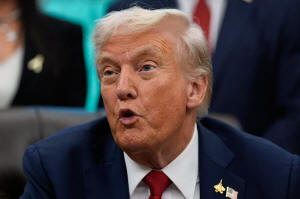Trump says US is in 'armed conflict' with drug cartels after ordering
strikes in the Caribbean
[October 03, 2025]
By AAMER MADHANI and LISA MASCARO
WASHINGTON (AP) — President Donald Trump has declared drug cartels to be
unlawful combatants and says the United States is now in an "armed
conflict” with them, according to a Trump administration memo obtained
by The Associated Press on Thursday, following recent U.S. strikes on
boats in the Caribbean.
The memo appears to represent an extraordinary assertion of presidential
war powers, with Trump effectively declaring that trafficking of drugs
into the United States amounts to armed conflict requiring the use of
military force — a new rationale for past and future actions.
“The President determined that the United States is in a
non-international armed conflict with these designated terrorist
organizations,” the memo says. Trump directed the Pentagon to “conduct
operations against them pursuant to the law of armed conflict.”
“The United States has now reached a critical point where we must use
force in self-defense and defense of others against the ongoing attacks
by these designated terrorist organizations,” the memo says.
Besides signaling a potential new moment in Trump's stated “America
First” agenda that favors non-intervention overseas, the declaration
raises stark questions about how far the White House intends to use its
war powers and if Congress will exert its authority to approve — or ban
— such military actions.

“The United States is taking a much more dramatic step — one that I
think is a very, very far stretch of international law and a dangerous
one," said Matthew Waxman, who was a national security official in the
George W. Bush administration. It "means the United States can target
members of those cartels with lethal force. It means the United States
can capture and detain them without trial.”
Declaration follows boat strikes in the Caribbean
The U.S. military last month carried out three deadly strikes against
boats in the Caribbean that the administration accused of ferrying
drugs. At least two of those operations were carried out on vessels that
originated from Venezuela.
Those strikes followed up a buildup of U.S. maritime forces in the
Caribbean unlike any seen in recent times. The Navy’s presence in the
region — eight warships with over 5,000 sailors and Marines — has been
pretty stable for weeks, according to two defense officials, who spoke
on condition of anonymity to discuss ongoing operations.
The memo did not include a timestamp, but it references a Sept. 15 U.S.
strike that “resulted in the destruction of the vessel, the illicit
narcotics, and the death of approximately 3 unlawful combatants.”
“As we have said many times, the President acted in line with the law of
armed conflict to protect our country from those trying to bring deadly
poison to our shores, and he is delivering on his promise to take on the
cartels and eliminate these national security threats from murdering
more Americans,” the White House said.

Pentagon officials briefed senators on the strikes Wednesday, according
to a person familiar with the matter, who was not authorized to comment
publicly and spoke on the condition of anonymity. The Pentagon referred
questions to the White House.
What the Trump administration laid out at the classified briefing at the
Capitol was perceived by several senators as pursuing a new legal
framework that raised questions particularly regarding the role of
Congress in authorizing any such action, that person said.
Pentagon officials also briefed House staffers last week on the strikes,
according to another person who was briefed on the meeting and similarly
spoke on condition of anonymity.
The memo, which was reported earlier by The New York Times, lays out a
rationale seen both as the administration's justification for the
military strikes it has already taken on the boats in the Caribbean —
which have raised concerns from lawmakers as potentially unlawful — as
well as any action to come.
[to top of second column]
|

President Donald Trump speaks in the Oval Office of the White House
before signing an executive order regarding childhood cancer and the
use of AI, Tuesday, Sept. 30, 2025, in Washington. (AP Photo/Alex
Brandon)

A White House official who wasn’t authorized to comment publicly and
spoke on condition of anonymity said the memo was sent to Congress
on Sept. 18 and does not convey any new information. The person
familiar with the Senate briefing said it was transmitted this week.
Details weren't given on the cartels targeted
Trump has designated several Latin American drug cartels as foreign
terrorist organizations, and the administration had previously
justified the military action as a necessary escalation to stem the
flow of drugs into the United States.
Pentagon officials could not provide a list of the designated
terrorist organizations at the center of the conflict, a matter that
was a major source of frustration for some of the lawmakers who were
briefed this week, according to one of the people familiar with the
briefings.
While “friendly foreign nations have made significant efforts to
combat these organizations,” the memo said, the groups “are now
transnational and conduct ongoing attacks throughout the Western
Hemisphere as organized cartels.” The memo refers to cartel members
as “unlawful combatants.”
The Trump administration is trying to justify the use of military
force against drug cartels in the same way the Bush administration
justified the war against al-Qaida following the Sept. 11 attacks,
said Waxman, who served in the State and Defense Departments and on
the National Security Council under Bush.

Bush, however, had authorization from Congress, unlike Trump. The
Trump administration is arguing that it no longer has to consider
the individual circumstances of using force, said Waxman, who now
chairs Columbia Law School’s National Security Law Program.
“It’s basically saying, ‘We don’t have to engage in that kind of
case-by-case decision-making,’” Waxman said. “All of these vessels
that are carrying enemy personnel can be targeted, whether they’re
headed towards the United States or not.”
Waxman said he expects more strikes and “we’ll see if the United
States takes the next big step and engages in lethal force or armed
force on the territory of another state.”
Lawmakers of both major political parties have pressed Trump to seek
war powers authority from Congress for operations against alleged
drug traffickers. Several senators and human rights groups have
questioned the legality of the strikes, calling them potential
overreach of executive authority in part because the military was
used for law enforcement purposes.
Sen. Jack Reed of Rhode Island, the top Democrat on the Senate Armed
Services Committee, said drug cartels are “despicable” but the Trump
administration has offered “no credible legal justification,
evidence or intelligence for these strikes.”
Reed, a former Army officer, said “every American should be alarmed
that their President has decided he can wage secret wars against
anyone he calls an enemy.”
___
Associated Press writers Konstantin Toropin, Ben Finley and Michelle
L. Price contributed to this report.
All contents © copyright 2025 Associated Press. All rights reserved
 |